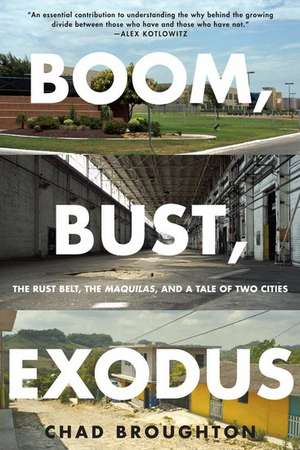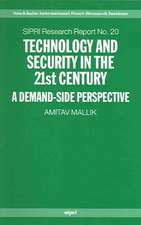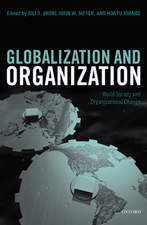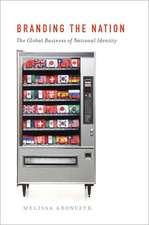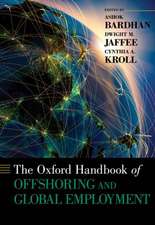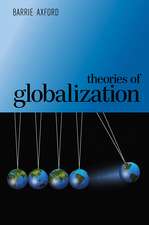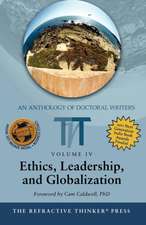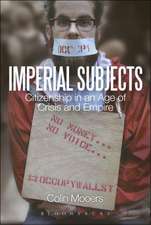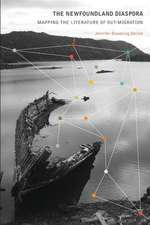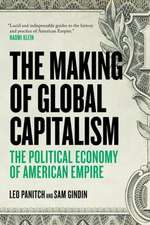Boom, Bust, Exodus: The Rust Belt, the Maquilas, and a Tale of Two Cities
Autor Chad Broughtonen Limba Engleză Paperback – 27 oct 2016
Preț: 138.15 lei
Nou
Puncte Express: 207
Preț estimativ în valută:
26.46€ • 27.26$ • 22.16£
26.46€ • 27.26$ • 22.16£
Carte disponibilă
Livrare economică 03-17 februarie
Preluare comenzi: 021 569.72.76
Specificații
ISBN-13: 9780190608866
ISBN-10: 0190608862
Pagini: 408
Ilustrații: 25 b/w images
Dimensiuni: 208 x 140 x 28 mm
Greutate: 0.45 kg
Editura: Oxford University Press
Colecția OUP USA
Locul publicării:New York, United States
ISBN-10: 0190608862
Pagini: 408
Ilustrații: 25 b/w images
Dimensiuni: 208 x 140 x 28 mm
Greutate: 0.45 kg
Editura: Oxford University Press
Colecția OUP USA
Locul publicării:New York, United States
Recenzii
Boom, Bust, Exodus brings to life the human impact of global industrial change on the people who live with it. Chad Broughton combines a journalist's eye for color and the telling detail with a scholar's grasp of his subject and skill in putting it all into context. There are heroes here, but few villains. Rather, Broughton tells in vivid prose what happens-both to people and their cities-when industry is ripped up from the places where it has always been and transplanted to places that weren't ready for it. Broughton knows the territory. He went to see and to listen, and he understands what he saw and heard. The result is a classic of post-industrial scholarship.
Chad Broughton has written a deeply-observed and nuanced account of one of the stories of our time: the migration of a once-thriving American factory over the border into Mexico. When he learns of Maytag's plans to shutter its refrigerator plant, a move decried by a young Senator Obama, Broughton begins a decade-long dive into the drama that envelops both Galesburg, Illinois, where townspeople are losing their $15.14-an-hour livelihood, and Reynosa, Mexico, where the same jobs will pay $1.10 and come with a cost. The results are both epic and surprising. The pitfalls of such a project are many, but Broughton avoids pity and screed, delivering a story that is beautifully detailed and rich in human and historic dimension. Most of us talk about a global economy with a vague sense of what that really means. With Boom, Bust, Exodus Broughton has defined it indelibly.
Chad Broughton's Boom, Bust, Exodus is a beautifully written, humanistic portrayal of globalization as is lived on a day-to-day basis. Using production as a through line, Broughton takes us from the Midwest to the border to the Mexican interior and back, unsentimentally but empathetically delineating the human consequences of capital mobility in North America in the 21st century.
Broughton has written a powerful indictment of corporate greed and poor public policy, balanced by a tribute to the perseverance of the working-class people of two nations... While most readers will be familiar with the growth of economic inequality in the U.S., Broughton's unflinching, empathetic account puts a human face to that idea.
Broughton's book provides ample documentation of a central truth of late-American history-namely, that capital has no country."
In this richly reported book, Chad Broughton gives us a birds-eye view of the intended and unintended consequences of globalization. Boom, Bust, Exodus is a deeply-felt and narrative-driven work, an essential contribution to understanding the why behind the growing divide between those who have and those who have not." -Alex Kotlowitz, author of There Are No Children Here and The Other Side of the River
Chad Broughton's well-written and incredibly engaging book poignantly captures the effects of industry relocation on individuals and towns in our globalized economy....For those concerned about the consequences of capital mobility on the lives of ordinary people, Boom, Bust, Exodus is a must-read." -William Julius Wilson, Harvard University
Anyone wishing to understand the human dimensions of the grinding process of North American economic integration should read Chad Broughton's moving tale of two cities." -Emilio Kourí, Director of the Katz Center for Mexican Studies, University of Chicago
Boom, Bust, Exodus is a story of intertwined lives....Connected by production and commerce, possession and dispossession, ownership and loss, profit and precariousness, the men and women and children caught in the shifting tides of a global economy have found in Chad Broughton a sympathetic and informed voice." -Jacob S. Hacker, co-author, Winner-Take-All Politics
A unique book, telling its story of the offshoring of a refrigerator plant at many levels-personal, local, national, international-and combining acute sociological analysis with life stories reaching across many years." -Andrew Abbott, Department of Sociology, University of Chicago
Broughton grounds his tale with ample historical context, tracing the rise and fall of the middle class in post-World War II America and Mexico's evolving economic policies with the United States . . . The heart of "Boom" is the people Broughton profiles as they adjust to life with and without Maytag.
As the economic watchword of the millennium, globalization is a cliché. But this story reveals the truly local results of this phenomenon. Though there aren't a lot of winners on the front lines, as in any good Dickens narrative, this tale shows that the human spirit rises above would-be captors.
Broughton describes a modern-day Dickensian nightmare, with workers flocking from formerly agricultural regions to work for Maytag and other US companies seeking to '"slough off not only union wages, pension obligations, taxes and regulations, but also any sense of obligation to the place where they made their money."' The author writes winningly of individual workers in both cities, but this book is as discouraging as it is necessary."
It took Broughton more than ten years to research and write this book, and he has crafted a narrative that reads like a novel, well placed a free of polemic. He puts a human face on economic inequity, and by showing that it is politics that brought us to the current predicament, he lets us see that it is through politics that we can find our way out. " -Texas Observer
[A]n extremely valuable account of how economic globalization is being experienced by those most directly affected by it." -CHOICE
Chad Broughton has written a deeply-observed and nuanced account of one of the stories of our time: the migration of a once-thriving American factory over the border into Mexico. When he learns of Maytag's plans to shutter its refrigerator plant, a move decried by a young Senator Obama, Broughton begins a decade-long dive into the drama that envelops both Galesburg, Illinois, where townspeople are losing their $15.14-an-hour livelihood, and Reynosa, Mexico, where the same jobs will pay $1.10 and come with a cost. The results are both epic and surprising. The pitfalls of such a project are many, but Broughton avoids pity and screed, delivering a story that is beautifully detailed and rich in human and historic dimension. Most of us talk about a global economy with a vague sense of what that really means. With Boom, Bust, Exodus Broughton has defined it indelibly.
Chad Broughton's Boom, Bust, Exodus is a beautifully written, humanistic portrayal of globalization as is lived on a day-to-day basis. Using production as a through line, Broughton takes us from the Midwest to the border to the Mexican interior and back, unsentimentally but empathetically delineating the human consequences of capital mobility in North America in the 21st century.
Broughton has written a powerful indictment of corporate greed and poor public policy, balanced by a tribute to the perseverance of the working-class people of two nations... While most readers will be familiar with the growth of economic inequality in the U.S., Broughton's unflinching, empathetic account puts a human face to that idea.
Broughton's book provides ample documentation of a central truth of late-American history-namely, that capital has no country."
In this richly reported book, Chad Broughton gives us a birds-eye view of the intended and unintended consequences of globalization. Boom, Bust, Exodus is a deeply-felt and narrative-driven work, an essential contribution to understanding the why behind the growing divide between those who have and those who have not." -Alex Kotlowitz, author of There Are No Children Here and The Other Side of the River
Chad Broughton's well-written and incredibly engaging book poignantly captures the effects of industry relocation on individuals and towns in our globalized economy....For those concerned about the consequences of capital mobility on the lives of ordinary people, Boom, Bust, Exodus is a must-read." -William Julius Wilson, Harvard University
Anyone wishing to understand the human dimensions of the grinding process of North American economic integration should read Chad Broughton's moving tale of two cities." -Emilio Kourí, Director of the Katz Center for Mexican Studies, University of Chicago
Boom, Bust, Exodus is a story of intertwined lives....Connected by production and commerce, possession and dispossession, ownership and loss, profit and precariousness, the men and women and children caught in the shifting tides of a global economy have found in Chad Broughton a sympathetic and informed voice." -Jacob S. Hacker, co-author, Winner-Take-All Politics
A unique book, telling its story of the offshoring of a refrigerator plant at many levels-personal, local, national, international-and combining acute sociological analysis with life stories reaching across many years." -Andrew Abbott, Department of Sociology, University of Chicago
Broughton grounds his tale with ample historical context, tracing the rise and fall of the middle class in post-World War II America and Mexico's evolving economic policies with the United States . . . The heart of "Boom" is the people Broughton profiles as they adjust to life with and without Maytag.
As the economic watchword of the millennium, globalization is a cliché. But this story reveals the truly local results of this phenomenon. Though there aren't a lot of winners on the front lines, as in any good Dickens narrative, this tale shows that the human spirit rises above would-be captors.
Broughton describes a modern-day Dickensian nightmare, with workers flocking from formerly agricultural regions to work for Maytag and other US companies seeking to '"slough off not only union wages, pension obligations, taxes and regulations, but also any sense of obligation to the place where they made their money."' The author writes winningly of individual workers in both cities, but this book is as discouraging as it is necessary."
It took Broughton more than ten years to research and write this book, and he has crafted a narrative that reads like a novel, well placed a free of polemic. He puts a human face on economic inequity, and by showing that it is politics that brought us to the current predicament, he lets us see that it is through politics that we can find our way out. " -Texas Observer
[A]n extremely valuable account of how economic globalization is being experienced by those most directly affected by it." -CHOICE
Notă biografică
Chad Broughton is Senior Lecturer in Public Policy Studies at the University of Chicago.
